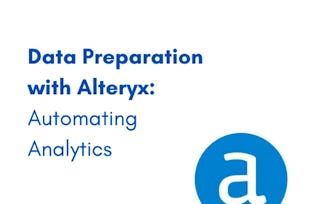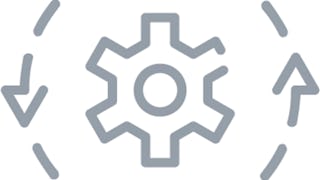This is the third course in the Google Data Analytics Certificate. As you continue to build on your understanding of the topics from the first two courses, you’ll be introduced to new topics that will help you gain practical data analytics skills. You’ll learn how to use tools like spreadsheets and SQL to extract and make use of the right data for your objectives, and how to organize and protect your data. Current Google data analysts will continue to instruct and provide you with hands-on ways to accomplish common data analyst tasks with the best tools and resources.

Prepare Data for Exploration

Prepare Data for Exploration
This course is part of Google Data Analytics Professional Certificate

Instructor: Google Career Certificates
1,068,207 already enrolled
Included with
23,069 reviews
Recommended experience
What you'll learn
Explain what factors to consider when making decisions about data collection.
Discuss the difference between biased and unbiased data.
Describe databases with references to their functions and components.
Describe best practices for organizing data.
Skills you'll gain
- Data Quality
- Databases
- Data Collection
- Data Ethics
- Data Import/Export
- Metadata Management
- Data Literacy
- Data Analysis
- Data Security
- SQL
- Unstructured Data
- Data Storage
- Data Management
- Google Sheets
- Skills section collapsed. Showing 13 of 14 skills.
Details to know

Add to your LinkedIn profile
29 assignments
See how employees at top companies are mastering in-demand skills

Build your Data Analysis expertise
- Learn new concepts from industry experts
- Gain a foundational understanding of a subject or tool
- Develop job-relevant skills with hands-on projects
- Earn a shareable career certificate from Google

There are 5 modules in this course
A massive amount of data is generated every single day. In this part of the course, you will discover how this data is generated and how analysts decide which data to use for analysis. You’ll also learn about structured and unstructured data, data types, and data formats as you start thinking about how to prepare your data for analysis.
What's included
9 videos10 readings6 assignments1 plugin
Before you work with data, you must confirm that it is unbiased and credible. After all, if you start your analysis with unreliable data, you won’t be able to trust your results. In this part of the course, you will learn to identify bias in data and to ensure your data is credible. You’ll also explore open data and the importance of data ethics and data privacy.
What's included
12 videos4 readings6 assignments
When you analyze large datasets, you’ll access much of the data from a database. In this part of the course, you will learn about databases, including how to access them and extract, filter, and sort the data they contain. You’ll also explore metadata to discover its many facets and how analysts use it to better understand their data.
What's included
10 videos13 readings12 assignments
Good organizational skills are a big part of most types of work, especially data analytics. In this part of the course, you will learn best practices for organizing data and keeping it secure. You’ll also understand how analysts use file naming conventions to help them keep their work organized.
What's included
3 videos3 readings4 assignments1 plugin
Having a strong online presence can be a big help for job seekers of all kinds. In this part of the course, you will explore how to manage your online presence. You’ll also discover the benefits of networking with other data analytics professionals.
What's included
2 videos4 readings1 assignment
Earn a career certificate
Add this credential to your LinkedIn profile, resume, or CV. Share it on social media and in your performance review.
Instructor

Offered by
Explore more from Data Analysis
 Status: Free Trial
Status: Free Trial Status: Free
Status: Free Status: Free Trial
Status: Free Trial Status: Free Trial
Status: Free Trial
Why people choose Coursera for their career

Felipe M.

Jennifer J.

Larry W.

Chaitanya A.
Learner reviews
- 5 stars
81.99%
- 4 stars
14.68%
- 3 stars
2.37%
- 2 stars
0.47%
- 1 star
0.47%
Showing 3 of 23069
Reviewed on Aug 8, 2023
I love how the course it's not limited to teach about the technical skills of a data analyst professional, but it also helps you discover some soft skills that make you a better human resource.
Reviewed on Dec 31, 2021
I liked that some assignments had me use SQL and get more comfortable using it. However I would have liked more assignments using SQL and Sheets to get more practice. Otherwise was pretty fun.
Reviewed on Jan 2, 2023
Very thorough course. It goes a great mile just to explain the littlest of concepts. I enjoyed the virtual desktop part, it made learning so interactive and almost like I was learning in real time.

Open new doors with Coursera Plus
Unlimited access to 10,000+ world-class courses, hands-on projects, and job-ready certificate programs - all included in your subscription
Advance your career with an online degree
Earn a degree from world-class universities - 100% online
Join over 3,400 global companies that choose Coursera for Business
Upskill your employees to excel in the digital economy
Frequently asked questions
Data is a group of facts that can take many different forms, such as numbers, pictures, words, videos, observations, and more. We use and create data everyday, like when we stream a show or song or post on social media.
Data analytics is the collection, transformation, and organization of these facts to draw conclusions, make predictions, and drive informed decision-making.
The amount of data created each day is tremendous. Any time you use your phone, look up something online, stream music, shop with a credit card, post on social media, or use GPS to map a route, you’re creating data. Companies must continually adjust their products, services, tools, and business strategies to meet consumer demand and react to emerging trends. Because of this, data analyst roles are in demand and competitively paid.
Data analysts make sense of data and numbers to help organizations make better business decisions. They prepare, process, analyze, and visualize data, discovering patterns and trends and answering key questions along the way. Their work empowers their wider team to make better business decisions.
You will learn the skill set required for becoming a junior or associate data analyst in the Google Data Analytics Certificate. Data analysts know how to ask the right question; prepare, process, and analyze data for key insights; effectively share their findings with stakeholders; and provide data-driven recommendations for thoughtful action.
You’ll learn these job-ready skills in our certificate program through interactive content (discussion prompts, quizzes, and activities) in under six months, with under 10 hours of flexible study a week. Along the way, you'll work through a curriculum designed with input from top employers and industry leaders, like Tableau, Accenture, and Deloitte. You’ll even have the opportunity to complete a case study that you can share with potential employers to showcase your new skill set.
After you’ve graduated from the program, you’ll have access to career resources and be connected directly with employers hiring for open entry-level roles in data analytics.
More questions
Financial aid available,

